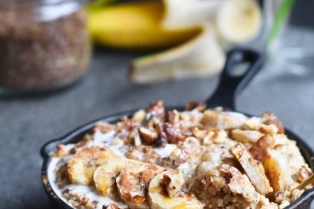
How healthy are frozen vegetables?
A pizza, some chicken nuggets. Frozen foods are not known for their healthy image by most of us. While the main offering is fast food, pre-cut vegetables and ready-to-use smoothie fruit mixes can also be found in the freezer section. And they aren't that bad. If we told you that freezing is even one of the best preservation methods, would you believe us?
Foods have been preserved for centuries to make them last longer. This can be done, for example, by drying, brine (salting) or cooling. By preserving foods you kill the pathogens or stop growth. As a result, food spoils less quickly, so that people are less likely to become ill.
Those who work with food will sooner or later have to deal with spoilage. Nutrient loss occurs from the moment fruit and vegetables are picked. It does not matter whether the product is frozen or fresh in the fruit and vegetable department at your local greengrocer. Fresh vegetables are still 'alive' after harvest and will gradually deteriorate in quality. Fresh vegetables can lose 50 percent vitamin C at room temperature after a week. Stored at 4°C, you can stretch this to ten days.
With freezing, this deterioration is halted. Before freezing, the fruit is blanched in water between 32 and 35 degrees Celsius. Blanching destroys the enzymes that cause discoloration. This way your fruit and vegetables will also look beautiful. However, there is a small loss of vitamin C: about 15 to 20 percent. Water-soluble vitamins (B-complex, vitamin C) are more sensitive to low temperatures than fat-soluble vitamins (vitamins A, D, E, K). Do you like to freeze pre-cut pieces of fruit and vegetables? Even then more vitamins will be lost than if you freeze vegetables in their entirety . Time to take a closer look at this special category of macronutrients. In general, the finer the food, the more vitamins are lost 1 .
Of course, the frozen offer extends further than just fruit and vegetables and there is little profit to be made on those pineapple slices from your pizza Hawaii. But the preservation method itself isn't that bad and in some cases even fresher than 'fresh' (get it?;). The nutrient content of frozen vegetables is at least as high as their fresh variety and in some cases even higher 2 . The greatest loss during freezing is the vitamin C content. Fortunately, we Dutch people get enough of that within 3 !
Fresh or frozen, it just depends on what you prefer. Fresh, of course, has a different taste experience than frozen , but it has a longer shelf life, so you can always easily have it "on hand" and often a lot cheaper. Whether you go for fresh or frozen. So it doesn't matter much for the health value.
Sources :
1. Food watch. (nd). Ask the dietician: nutritional value of fresh vegetables vs canned/frozen .
2. Pubmed. (2015). Vitamin retention in eight fruits and vegetables: a comparison of refrigerated and frozen storage .
3. RIVM. (2016). Vitamin C intake

